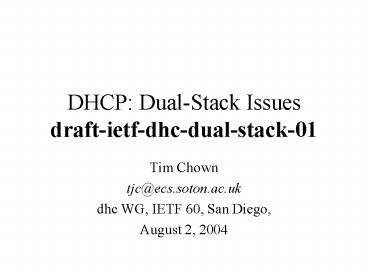DHCP: Dual-Stack Issues draft-ietf-dhc-dual-stack-01 PowerPoint PPT Presentation
1 / 17
Title: DHCP: Dual-Stack Issues draft-ietf-dhc-dual-stack-01
1
DHCP Dual-Stack Issuesdraft-ietf-dhc-dual-stack-
01
- Tim Chown
- tjc_at_ecs.soton.ac.uk
- dhc WG, IETF 60, San Diego,
- August 2, 2004
2
The crux
- Nodes in a dual-stack environment may require
IPv4 and IPv6 configuration (addresses and/or
options). - Should we advocate separate DHCPv4 and DHCPv6, or
add options to DHCPv6 to handle serving DHCPv4
information? - If we choose to have separate servers, how do we
ensure the multiple sources of configuration
information are handled by the clients?
3
DHCP servers
- DHCPv4 (RFC2131)
- DHCP for IPv4
- DHCPv6 (RFC3315)
- For IPv6 nodes using full stateful
autoconfiguration for address and other
configuration options - Stateless DHCPv6 (RFC3736)
- For IPv6 nodes using IPv6 stateless address
autoconfiguration (RFC2462), only using DHCP for
configuration options (DNS, etc)
4
Configuration information
- For example
- IPv4 address
- IPv6 address
- DNS server
- NTP server
- NIS server
- DNS search path
- May receive IPv4 and/or IPv6 addresses for
configuration options
5
Issue 1 multiple responses
- How to handle multiple responses?
- Use most recent data?
- Prefer DHCPv6 served data or option addresses?
- Round robin?
- In some cases this may not be an issue, e.g. two
different DNS servers should give consistent
responses to DNS queries. - There may be other sources of configuration data,
e.g. NIS, manually configured files, etc.
6
Issue 2 administration
- It may be the case that DHCPv4 and DHCPv6 servers
are maintained by different administrative
entities - This can be argued to be a multihoming issue?
7
Issue 3 multiple interfaces
- IPv4 and/or IPv6 may be run on different node
interfaces - So are the received configuration data and
settings per interface or per node? - DHCPv6 has the DHCP Unique Identifier (DUID)
concept to supercede MAC address, DHCP for IPv4
is introducing this concept - draft-ietf-dhc-3315id-for-v4-02
8
Issue 4 DNS load balancing
- The DHCP server returns different DNS data to
different nodes to load balance between multiple
local resolvers - May be problematic if trying to balance with
DHCPv4 and DHPCv6 servers both used - Could apply to other services, e.g. NTP
9
Issue 5 DNS search path
- The search path may vary for administrative
reasons - For example, new IPv6 services may be offered for
foo.com under .ipv6.foo.com
10
Issue 6 Protocol startup
- (This has been added in -01 draft)
- What happens if the IPv6 interface (transport) is
started after DHCPv4 was used to configure the
client? - Should that data be discarded, or merged with any
subsequent DHCPv6 response - Is the timing issue important?
11
Issue 7 DHCP option variations
- Some DHCPv4 options arent present in DHCPv6
- IP version limitations exist, e.g. only IPv6
servers may be in an IPv6 NTP option - DHCP and DHCPv6 option numbers may be different
- Some sites may use IPv4-mapped addresses in
DHCPv6-based options - is this a bad thing? - Should DHCPv6 options exist that can carry IPv4
and IPv6 addresses?
12
Two solutions
- Run separate DHCP and DHCPv6 servers
- Run a single DHCPv6 server, and add capability to
serve IPv4 addresses and options - Can we agree on a preferred approach?
13
Separate servers (1)
- Servers may or may not be on same node
- Server configuration data could be generated from
a single database - Implies client has heuristics to handle (merge)
multiple server responses - In some cases inconsistencies wont matter
- Need a per-host preference method, e.g. Prefer
DHCPv6 - Need a method to merge list responses, e.g.
alternate, DHCPv6 first - How to handle merging names and addresses?
14
Separate servers (2)
- If we take this approach, we need to identify
situations where differences in DHCPv4 and DHCPv6
responses may impact node behaviour - We must place some faith in the site
administrator to configure the DHCPv4 and DHCPv6
servers consistently - But we need to be confident that functionality is
retained (e.g. DNS load balancing) - If we take this path, we need to complete this
task
15
Single DHCPv6 server (1)
- Have just one (DHCPv6) server
- Modify DHCPv6 to return IPv4 information (over
IPv6 transport/lookup) - Possibility is hinted at in RFC3315
- Single server and transport leads to simplicity
and predictability, and less failure modes - Do we want dual-stack nodes to use separate
DHCPv4 and DHCPv6 servers for the next 10 or 20
years?
16
Single DHCPv6 server (2)
- A number of potential problems/issues arise
- IPv4-only nodes cant use DHCPv4 any more if you
do run DHCPv4 for these nodes, you then still
have duplication of information - An IPv6-only node cant use DHCPv4 responses
- What if a responding DHCPv6 server isnt able or
configured to serve IPv4 information? - If IPv4 addresses are allocated from DHCPv4 and
DHPCv6 servers, more stress is placed on valuable
IPv4 address space - The DHCPv6 specification will become more complex
and bloated to enable this capability
17
Way forward?
- Can we agree one path?
- The list seems to lean towards separate servers,
but its not clear the consensus is strong? - If we adopt the two server approach, we need to
do more analysis of inconsistency impact, methods
to specify preferences, etc. - There is one early implementation of preferences
- Should we abstract the multihoming/dna issues?
- Need to answer these two and edit to -02 version
before any WGLC could be considered

